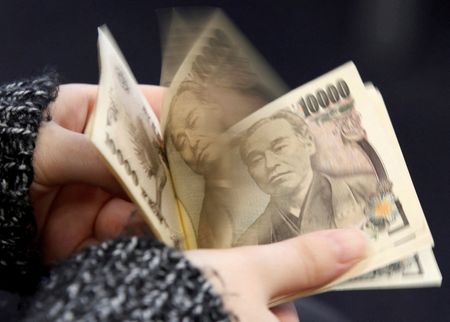 1
1 1
1
By Naomi Rovnick, Alun John and Ankur Banerjee
LONDON/SINGAPORE (Reuters) – The Japanese yen is on a bumpy path towards strengthening after Friday’s central bank policy change, threatening to upend the carry trade, one of this year’s most popular strategies, as the currency inevitably becomes more expensive.
The BOJ kept its short-term interest rate target below zero, but shook markets by adjusting a policy that had effectively capped the 10-year government bond yield at 0.5%.
The wild swings in the yen, which saw its most volatile trading day for months, reflect the initial confusion among traders and investors about what this might mean.
But two things are already clear: trading in the yen will be choppy, and have a knock-on impact on markets beyond Japan.
A rocketing yen has major implications for risk assets that have been at least in part supported by the trillions of dollars in global liquidity the BOJ has effectively exported.
In what is known as a carry trade, investors have borrowed cheaply in yen to fund bets in higher-yielding currencies like the dollar or the Mexican peso, making money on the difference.
“All these markets are linked together in terms of global liquidity flows. People borrow in yen to buy dollars, dollars sit around looking for something to do, people say we might buy Treasuries or Apple,” Simon Edelsten, global equities fund manager at Artemis, said.
“All this liquidity creation out of cheap Japanese money feeds into risk assets – at the margin, but enough to move prices.”
In a sign of what might be to come, on Friday the yen strengthened by as much as 1.2% on the day against the dollar, then weakened 1%, before settling not far from flat around 139 per dollar.
The currency has been under heavy pressure in the past 12 months, as other central banks raised rates while the BOJ kept borrowing costs on a tight leash. But the broad direction of travel for the yen is now thought to be towards strength.
The BOJ’s shift “underscores a strengthening bias in the yen. I wouldn’t be surprised to see it go to a low to mid 130s area because we are looking at yields compressing,” said Aninda Mitra, head of Asia macro and investment strategy at BNY Mellon Investment Management.
RISKIER GOLD SEAM
Japan’s low yields relative to those elsewhere – a gap which widened significantly in 2022 – has caused both domestic and foreign investors to dump Japanese assets in favour of higher-yielding alternatives overseas.
The yen has been an obvious base for carry trades – in the last 12 months it has lost 25% in value against the Mexican peso and 10% against the pound, for example – but that trend might be about to change.
Mitra said carry trades would “probably come under pressure if the yen appreciates from here by 2-4%. If your carry expectation was 5-6% return versus yen then clearly that starts to erode”.
The yen isn’t finished as a funding currency just yet, as Japanese yields remain much lower than those elsewhere.
“The carry trade is going to become less profitable. You’re mining the riskier a bit of the of the seam of gold,” said Kit Juckes head of FX strategy at Societe Generale, who expects any yen appreciation to be gradual.
“But for now you kind of feel it’s still worth it.”
MUDDLING THROUGH
A further difficulty when predicting what the BOJ’s shift in stance will mean for markets is whether investors understand the new policy.
“They’re essentially digging themselves a deeper hole in terms of making it very, very difficult for the market to take away simple things. They’re trying to control too many variables,” said James Malcolm, head of FX strategy at UBS investment bank.
“You know, still having a 50-basis point ceiling but saying that you’re not going to police it and you’re going to have a hard ceiling above there that you will police,” he said. “It’s a very difficult concept to get across to anybody who’s not willing to spend an awful lot of time and effort following it.”
(Reporting by Alun John and Naomi Rovnick in London, and Ankur Banerjee and Tom Westbrook in Singapore; Editing by Amanda Cooper and Catherine Evans)